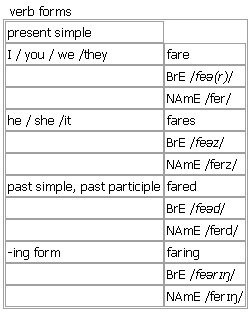 fare
fare

fare [fare fares fared faring] noun, verb BrE [feə(r)] NAmE [fer]
noun
1. countable, uncountable the money that you pay to travel by bus, plane, taxi, etc
•bus/taxi fares
•train/rail fares
•Children travel (at) half fare.
•When do they start paying full fare?
see also ↑airfare, return fare
2. countable a passenger in a taxi
•The taxi driver picked up a fare at the station.
3. uncountable (old-fashioned or formal)food that is offered as a meal
•The restaurant provides good traditional fare.
• (figurative)His student drawings were not standard art school fare.
Word Origin:
Old English fær, faru ‘travelling, a journey or expedition’, faran ‘to travel’, also ‘get on (well or badly’), of Germanic origin; related to Dutch varen and German fahren ‘to travel’, Old Norse ferja ‘ferry boat’, also to ↑ford. Senses 1 and 2 of the noun stem from an earlier meaning ‘a journey for which a price is paid’. Noun sense 3 was originally used with reference to the quality or quantity of food provided, probably from the idea of faring well or badly.
Example Bank:
•Children travel at half fare.
•Court trials involving famous people are the daily fare of newspapers.
•He faces charges of dodging taxi fares.
•I'm afraid you will have to pay the full fare.
•Last-minute fares start at $219 each way.
•Round-trip fares range from $118 to $258.
•The airline has introduced a cheap fare to New York.
•The band's music was standard rock fare.
•The company is promising reductions in fares.
•The fare will cost you less if you travel midweek.
•The return fare will cost you less than two single tickets.
•The taxi driver picked up a fare outside the opera house.
•They caught him trying to dodge bus fares.
•This movie is perfect family fare.
•a restaurant serving traditional Scottish fare
•a simplified fare structure
•a special fare deal for air travellers
•air fares slashed by a massive 30%
•tourists seeing the sights and sampling the local Mexican fare
•Cheap fares mean using your car is unnecessary.
•Do you want the standard fare or the first-class fare?
•Fare dodgers will be dealt with severely.
•Fares can be expensive in the city.
•Fares have been increased by 10%.
•How much is the return/single fare?
•I spend about £40 a week on fares.
•Pay your fare at the ticket office.
•Round-trip fare from New York to Cincinnati is $229.
•The new mayor has promised to reduce fares on all buses and trains.
•The restaurant serves good traditional fare.
•a bus/taxi/rail/air fare
•one-way fare
verb intransitive ~ well, badly, better, etc.
to be successful/unsuccessful in a particular situation
Syn: ↑get on
•The party fared very badly in the last election.
•The North, by and large, has fared better than most regions in avoiding high unemployment figures.
Verb forms: 
Word Origin:
Old English fær, faru ‘travelling, a journey or expedition’, faran ‘to travel’, also ‘get on (well or badly’), of Germanic origin; related to Dutch varen and German fahren ‘to travel’, Old Norse ferja ‘ferry boat’, also to ↑ford. Senses 1 and 2 of the noun stem from an earlier meaning ‘a journey for which a price is paid’. Noun sense 3 was originally used with reference to the quality or quantity of food provided, probably from the idea of faring well or badly.
Example Bank:
•He fared well against his main rival.
•She should fare better in this competition.
•This movie fared poorly at the British box office.
|
|
